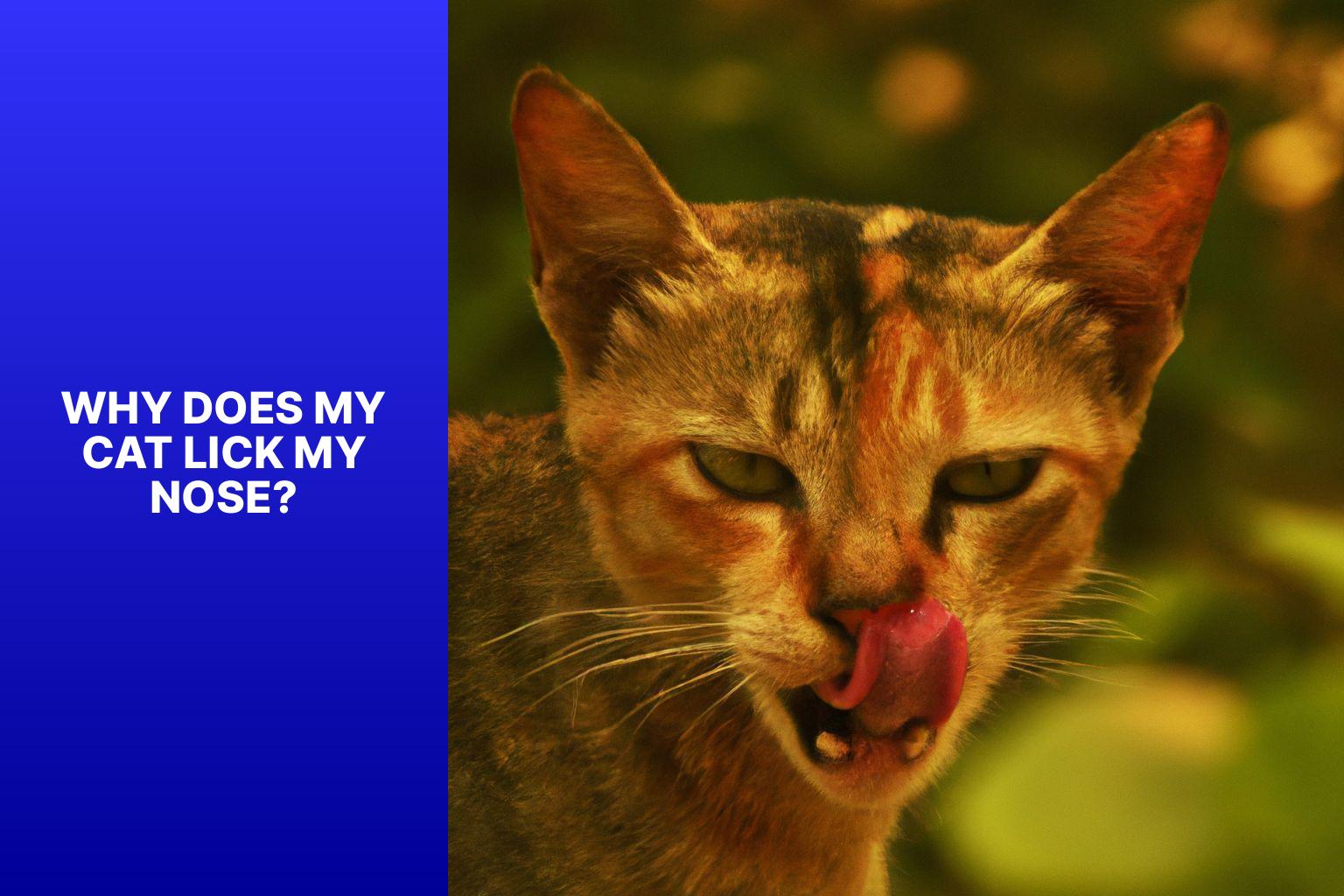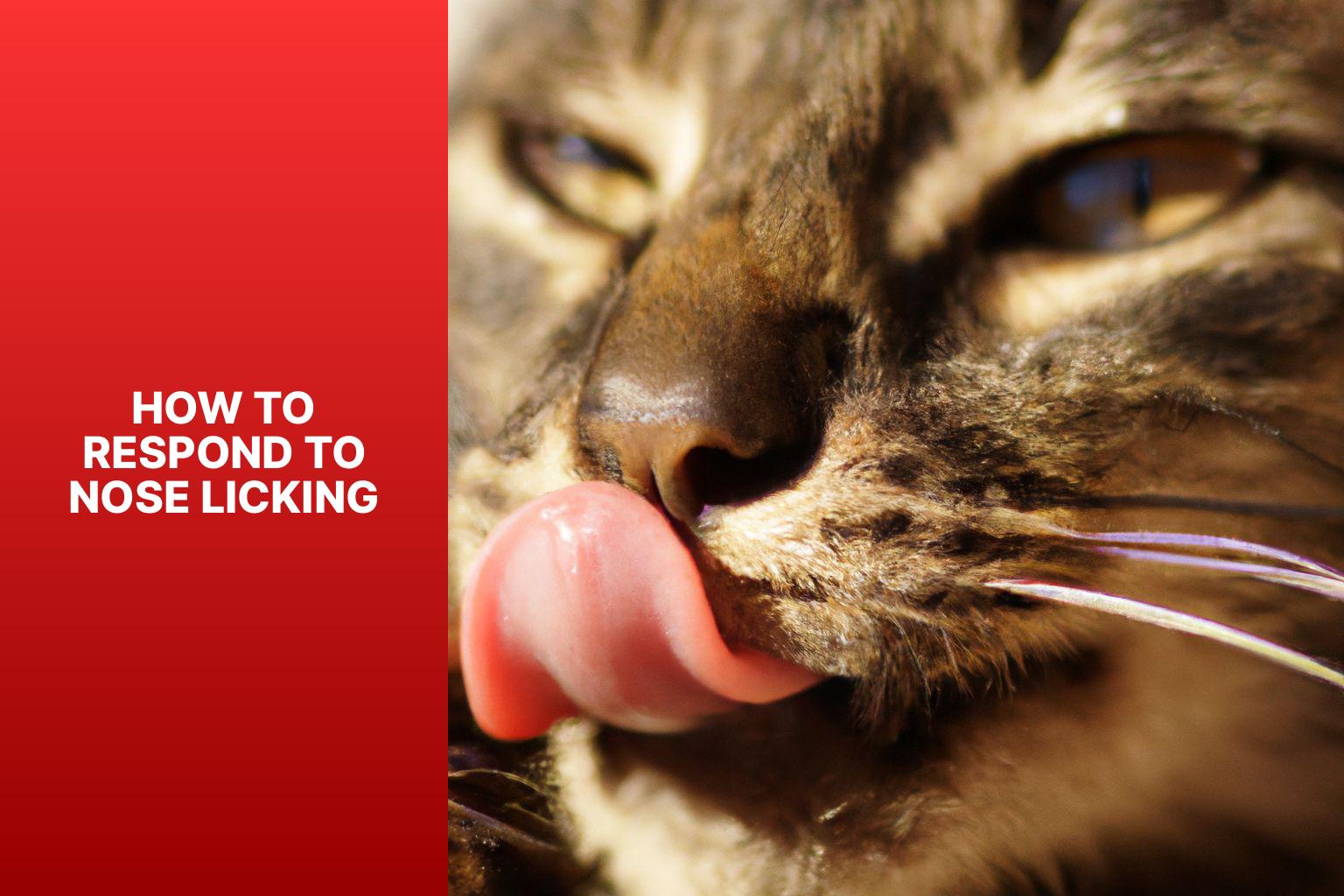Cats are known for their intriguing and sometimes puzzling behaviors. One of these behaviors that often leaves cat owners questioning is why their feline companion licks their nose. This article aims to explore the reasons behind this peculiar behavior and shed light on the significance it holds in the feline world.
Understanding cat behavior is key to deciphering their actions. When it comes to nose licking, there are a few possible explanations rooted in a cat’s natural instincts and social interactions. Some of these include:
1. Affection and Bonding: Cats may lick their owners’ noses as a sign of affection and to strengthen their bond with them.
2. Grooming Instinct: Cats are meticulous groomers, and licking is a way for them to groom not only themselves but also their favorite humans.
Delving deeper into the significance of nose licking, it becomes apparent that it serves multiple purposes for felines. These include:
1. Marking Territory: Cats have scent glands in their mouths, and nose licking can be a way for them to mark their owners as part of their territory.
2. Communication and Social Interaction: Licking the nose can be a form of communication, expressing contentment, and initiating social interactions with their owners.
3. Seeking Attention: Cats may lick their owners’ noses to grab attention or as a request for affection and interaction.
While the above reasons provide valuable insights, there can also be other explanations for nose licking. These include the taste and smell of the owner’s skin, sensitivity of the nose to the owner’s scent, or the behavior being reinforced through positive association.
When it comes to responding to nose licking, it’s essential to consider the context and individual cat’s preferences. Setting boundaries and redirecting the behavior to alternate forms of affection, such as petting or playing, can be beneficial in establishing a balanced interaction with your cat.
By exploring the reasons behind this behavior and understanding your cat’s unique needs, you can strengthen your bond and ensure a harmonious relationship with your furry friend.
Key takeaway:
- Affection and Bonding: Cats licking their owner’s nose is a behavior that shows affection and strengthens the bond between them.
- Grooming Instinct: Nose licking is a grooming instinct in cats, as they lick their own fur to keep themselves clean.
- Communication and Social Interaction: Nose licking by cats can be a form of communication or social interaction, indicating a desire for attention or establishing territory.
Why Does My Cat Lick my Nose?
Photo Credits: Www.Catcornerblog.Com by Eric Martinez
Why Does My Cat Lick my Nose?
Cats lick their owners’ noses for a few reasons. Cats lick noses to show affection, mark territory, communicate, explore, and seek comfort. Licking is a grooming behavior that shows they care for their owners and want to bond with them. By licking noses, cats leave their scent and claim their owners as their territory. Licking can also be a way for cats to say hello and ask for attention. They may be curious about the taste and smell of their owner’s skin and are exploring their surroundings. Licking can also be soothing for cats, helping them relax and feel more comfortable. Understanding your cat’s behavior and body language can help strengthen the bond between you and your cat. Note that not all cats lick their owners’ noses, and each cat may have different reasons for doing so.
Understanding Cat Behavior
Cats have their unique ways of showing affection and peculiar behaviors that leave us wondering. In this exploration of cat behavior, we’ll uncover fascinating insights into why our feline friends lick our noses. We’ll delve into the sub-sections of affection and bonding, where we’ll discover the deep emotional connection behind this behavior. We’ll explore the grooming instinct, shedding light on why cats extend their grooming habits to include our noses. Prepare to unravel the mysteries of your cat’s adorable quirks!
Affection and Bonding
Cats demonstrate their affection and bonding with their owners by licking their noses. This loving behavior is typically observed in cats who share a close relationship with their owners. The act of licking triggers the release of endorphins in cats, which brings them pleasure and relaxation. When a cat licks your nose, it is their way of expressing love and seeking comfort, signifying that they feel safe and content in your presence.
Nose licking is also a natural grooming behavior for cats, serving the purpose of keeping their fur clean and strengthening social bonds. By licking your nose, your cat includes you in this grooming ritual, considering you as part of their family or social group.
Should your cat lick your nose, it is crucial to respond positively and show appreciation for their gesture. You can gently stroke them or provide verbal reassurance. It is essential to establish boundaries and limits if excessive licking becomes uncomfortable.
Grooming Instinct
The grooming instinct is a natural behavior exhibited by cats and serves various purposes. It plays a vital role in the following explanations for the grooming instinct:
1. Cleaning and hygiene: Grooming is crucial for cats to ensure proper cleanliness and hygiene. They utilize their tongues to meticulously clean their fur, eliminating any dirt, debris, and excess oils.
2. Social bonding: Mutual grooming between cats fosters stronger social bonds. When cats coexist, they often engage in grooming sessions to establish and strengthen relationships with their feline companions.
3. Temperature regulation: Cats groom themselves to regulate body temperature effectively. Their saliva acts as a cooling agent when it evaporates, providing relief from excessive heat. During colder temperatures, grooming assists in distributing natural oils and insulating their fur for added warmth.
4. Stress reduction: Engaging in grooming activities has a soothing effect on cats. It triggers the release of endorphins, which are the body’s natural feel-good hormones. This, in turn, helps alleviate stress and anxiety in felines.
5. Maintaining appearances: Grooming is essential for cats to keep their fur in a neat and tidy condition. It enables them to display dominance and assert their territory.
Understanding the grooming instinct in cats is crucial for cat owners. It not only strengthens the bond with their feline companions but also ensures their overall well-being.
The Significance of Nose Licking
Curiosity piqued? Let’s dive into the fascinating world of nose licking. In this section, we’ll uncover the significance behind this peculiar behavior, exploring its various sub-sections: marking territory, communication and social interaction, and seeking attention. Get ready to uncover surprising insights, backed by real-life feline facts, as we unravel the mysteries of why our cats insist on giving our noses a thorough lick!
Marking Territory
Cats use marking territory to establish and communicate ownership of an area. When a cat licks your nose, they transfer their scent onto you, marking you as part of their territory. Nose licking is common in cats towards their owners, indicating a strong bond and a desire to claim ownership. By marking you with their scent, cats ensure that other animals understand you belong to them and are protected. This behavior is more common in unneutered cats, who have a stronger drive to mark territory and assert dominance.
If your cat excessively licks your nose, it may indicate stress or anxiety. Pay attention to changes in their environment or routine that could be causing these feelings. It’s important to understand that marking territory is a natural behavior for cats and should not be discouraged. If the behavior becomes excessive or bothersome, redirect their attention by providing alternative forms of enrichment and play.
True story: I have a cat named Whiskers who loves to lick my nose. Every morning when I wake up, she jumps on the bed and starts licking my nose as a way to greet me and mark her territory. It’s her unique way of showing affection and reminding me that I am part of her family. I find it endearing and a special bond between us.
Communication and Social Interaction
Cats communicate through various behaviors, and nose licking is one form of communication and social interaction. When a cat licks your nose, it can be a sign of affection and bonding. By licking your nose, your cat is showing trust and considering you part of their social group. Nose licking can also indicate a grooming instinct. Cats groom each other as a way of bonding and showing care. Licking your nose may be your cat’s way of trying to groom you, as they would groom a fellow cat.
Another reason for nose licking is seeking attention. If your cat wants your attention or wants to play, they may lick your nose to get your focus and start interaction. Evaluate the context of the nose licking. If your cat is purring or relaxed, it’s likely a positive form of communication. If your cat seems anxious or displays aggressive behavior alongside nose licking, set boundaries and provide reassurance to avoid misunderstandings or discomfort. Encouraging alternate forms of affection, such as petting or playing, can redirect your cat’s desire for social interaction without nose licking.
Seeking Attention
When your cat licks your nose, it is seeking attention. Cats groom their owners to engage and bond with them. By licking your nose, your cat communicates its desire for your attention and affection. To respond, evaluate the context and take time to engage with your cat through petting, playing, or cuddling. Set boundaries so your cat understands appropriate times for seeking attention. Redirect its behavior by offering alternative interactions like playing with a toy or giving a treat. Interacting with your cat enhances its well-being and strengthens the bond between you. Always respond to your cat’s attention-seeking behavior in a positive and loving manner.
Other Possible Explanations for Nose Licking
Curious about why your feline friend insists on giving your nose a good lick? Let’s explore some of the intriguing reasons behind this behavior. From the fascinating world of taste and smell to their unique sensitivity to skin texture, we’ll uncover the various factors that might contribute to your cat’s nose licking habits. As we delve deeper, we’ll also shed light on how certain behaviors can be reinforced, shedding new light on the intriguing relationship between you and your kitty. Get ready to discover the lesser-known explanations for this adorable feline quirk!
Taste and Smell
Taste and smell play a significant role in why cats lick their owners’ noses. Cats, with their highly developed taste buds and olfactory receptors, have the ability to detect a wide array of flavors and scents. When a cat licks its owner’s nose, it could be gathering valuable information about the owner’s scent and taste.
In regards to taste, cats possess taste buds that are sensitive to sweet, sour, and bitter flavors. Some cats may even have specific preferences for certain flavors. On the other hand, when it comes to smell, cats rely on their strong sense of smell to explore and identify their surroundings. They can pick up on subtle scents and pheromones, which can greatly influence their behavior and interactions.
If a cat licks your nose, it is essential to consider the context and the cat’s behavior. If you find it uncomfortable, gently redirect their attention to activities such as petting or playing. It is crucial to establish boundaries and consistent rules for behavior. Providing a stimulating environment with a variety of scents and tastes can enhance their sensory experience and reduce nose licking. By understanding your cat’s preferences and needs, you can strengthen your bond with them.
Skin Sensitivity
Skin sensitivity can contribute to cats licking their owners’ noses. Here are some reasons for this behavior:
–
Increased sensitivity: Cats have highly sensitive noses and may be attracted to the scent or texture of their owner’s skin. They lick the nose to explore and interact.
–
Excess oil and sweat: The nose can produce oils and sweat with interesting smells and tastes. Cats gather information through these scents and tastes.
–
Allergic reactions: Some cats lick their owner’s nose due to an allergic reaction. Licking may alleviate discomfort from skin sensitivity.
–
Seeking comfort: Cats find comfort in physical contact. Licking the owner’s soft and sensitive nose provides security and relaxation.
–
Attention-seeking behavior: If licking the owner’s nose gets attention or affection, it can become a reinforced behavior. Skin sensitivity may not be the cause.
Observe your cat’s behavior and consult a veterinarian if you have concerns about skin sensitivity or any unusual behaviors.
Reinforced Behavior
Reinforced behavior, also known as behavior that is consistently rewarded and likely to be repeated in the future, is applicable to the nose licking behavior displayed by cats. Nose licking in cats serves as a means of grooming and social interaction and can be reinforced through positive responses from their owners.
When a cat receives attention, affection, or treats in response to licking their owner’s nose, they may associate this behavior with positive outcomes and continue doing it in order to obtain rewards. It should be noted that reinforced behavior can occur unintentionally as well. For instance, if a cat licks their owner’s nose and the owner reacts with laughter or excitement, the cat may perceive this as a positive response and be more inclined to repeat the behavior in the future. As such, cat owners should be mindful of the potential for reinforced behavior when managing nose licking.
If nose licking becomes excessive or unwanted, it may be necessary to discourage the behavior by withholding reinforcement or redirecting the cat’s attention to more appropriate forms of interaction. A comprehension of reinforced behavior can assist cat owners in effectively addressing and modifying their cat’s behavior as necessary.
How to Respond to Nose Licking
Photo Credits: Www.Catcornerblog.Com by Ethan Carter
Wondering how to handle your feline friend’s nose licking antics? We’ve got you covered! Dive into the realm of responding to nose licking with finesse and understanding. From evaluating the context to setting boundaries and encouraging alternate forms of affection, this section serves as your guide to navigate this peculiar yet endearing behavior. Let’s explore effective ways to engage with your curious kitty and foster a paw-sitive bond!
Evaluate the Context
To accurately evaluate the context and understand why your cat licks your nose, it is essential to consider several factors. These factors include timing, body language, environment, other interactions, and your reaction.
Firstly, observe the timing when your cat licks your nose. Take note if it happens during playtime, when you wake up, or when you give them attention.
Secondly, pay attention to your cat’s body language. Notice if they appear relaxed and show signs of affection or if they seem anxious or aggressive.
Thirdly, consider the environment in which your cat licks your nose. Determine if it occurs in a calm and familiar setting or if there are other stimuli that might be influencing their behavior.
Take into account the overall relationship with your cat. Look for other affectionate behaviors they engage in with you, such as rubbing against your legs or purring.
Reflect on how you respond to your cat’s nose licking. Consider if you provide them with attention or affection when they do it.
By carefully evaluating these contextual factors, you can gain insight into why your cat licks your nose. This behavior could be a sign of affection and bonding, a grooming instinct, or a way of marking territory. Understanding these reasons will enable you to respond appropriately and facilitate a positive interaction with your feline companion.
Set Boundaries
When your cat licks your nose, it is important to establish boundaries to ensure a respectful relationship. Here are some effective ways to set boundaries:
1. Redirect attention: Gently guide your cat’s head away from your nose and direct their attention to a toy or some other engaging activity.
2. Use verbal cues: Firmly say “no” or “stop” to communicate to your cat that nose licking is not acceptable behavior.
3. Provide alternative surfaces: Offer your cat a scratching post or a grooming brush to encourage them to engage in natural grooming behaviors.
4. Ignore the behavior: If your cat persists in licking your nose, it is best to ignore it. This sends a clear message that the behavior is not desired.
5. Be consistent: Every time your cat licks your nose, reinforce the boundaries and consistently remind them to respect your personal space. In doing so, they will learn to understand and abide by these boundaries.
Always remember that cats have highly sensitive senses of smell, enabling them to detect changes in their environment. It is crucial to respect their boundaries while also establishing your own for a harmonious and mutually beneficial relationship.
Encourage Alternate Forms of Affection
Encouraging alternate forms of affection in cats strengthens the bond between you and provides them with multiple ways to express love. Here are some strategies for building that bond:
– Engage in interactive play sessions with toys like feather wands or laser pointers. This not only provides mental and physical stimulation, but also creates a fun and affectionate bonding experience.
– Pet or brush your cat gently, according to their preferences. Use slow, gentle strokes to help them relax and enjoy the affectionate experience.
– If your cat enjoys being close, take the opportunity to cuddle up with them on your lap or next to you on the couch. Use positive reinforcement, such as treats or praise, to encourage alternate forms of affection and reward them for showing affection in this way.
– Show affection by offering your cat their favorite treats. Use treats in moderation to encourage alternate forms of affection, reward good behavior, or create a special bonding experience.
– Talk to your cat in a soothing and positive tone. Use words of affection, like their name or sweet nicknames, to encourage alternate forms of affection and create a bond that makes them feel loved.
– Simply spending time with your cat, whether sitting quietly in the same room, reading a book, or watching TV, can be a way to show affection. Cats appreciate the presence and attention of their favorite humans.
Remember, every cat is unique, so pay attention to their preferences and body language to ensure you’re encouraging alternate forms of affection and providing the affection they enjoy.
Some Facts About Why Cats Lick Their Owners’ Noses:
- ✅ Cats lick their owners’ noses to show affection and bond with them. (Source: Our Team)
- ✅ Licking the nose is a learned behavior from the cat’s mother, and it is a sign of love. (Source: Our Team)
- ✅ Cats may lick their owners’ noses to assert ownership and show that they belong to the family unit. (Source: Our Team)
- ✅ Licking the nose is a way for cats to get attention and be the center of their owner’s world. (Source: Our Team)
- ✅ Cats may lick their owners’ noses to clean them and expect the same hygiene standards from their family members. (Source: Our Team)







